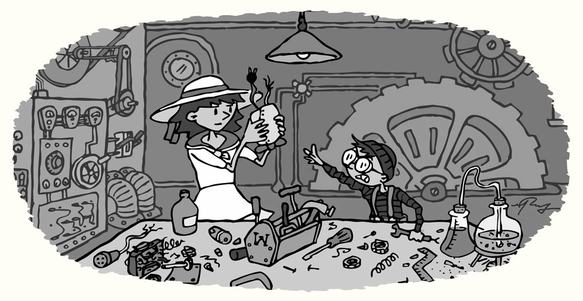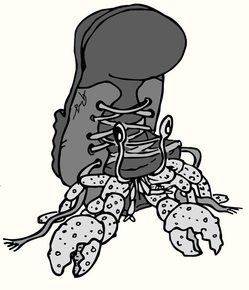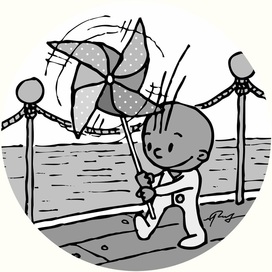| Verona peered through the doorway. Waldo, the second-youngest Wicklow and the ship’s engineer, sat at his workbench, tinkering. The engine room was also Waldo’s room. Ordinarily, it clanked and rattled with gears, wheels, belts, and other mechanical instruments which pulled power from the ship’s great windmill-sails, but as there was no wind at the moment, all the machinery stood still and silent. Verona could hear her own heartbeat. It reminded her of the dead flies which sometimes collected on the windowsills—one day buzzing with activity, the next, stiff and lifeless. She shivered. “Why are you holding a clock?” Waldo asked. His voice echoed across the room. Verona ignored the question. She hurried over to Waldo’s workbench, where lay scattered hundreds of mechanical bits and bobs, tools and instruments, and half-finished inventions, contraptions, devices, and apparatuses of every imaginable sort. She began to rummage through it all. “Oh, sure!” Waldo said, dropping his wrench. “Just come right in and make a mess!” “Waldo, you’re quite clever,” Verona said. “Can’t you invent us something to bring the wind back? What about this?” She held up a device with a propeller on it. “That’s a vegetable peeler, and it’s broken,” said Waldo. He yanked it from her hands and pushed her away from his workbench. “I can’t control the wind,” he continued, “and even if I could, I wouldn’t. I’m glad it’s gone! Without the waves knocking us around I can do some work on smaller things, like this wind-up toothbrush. And besides, Abbot won’t get seasick.” Verona threw up her hands. “What’s that supposed to mean?” Waldo held up a large shoe. Peering closer, Verona spotted two gleaming eyes inside. Slowly, skinny limbs unfolded one by one, and there emerged from within the shoe a sizable hermit crab. Waldo set the creature on the floor, but it was shy and followed him closely by the heels. “A seasick hermit crab?” said Verona. “I’ve never heard of anything more ridiculous!” “Go away, I’ve got work to do!” said Waldo. He shooed her out of the engine room and slammed the door. Verona clutched her clock and sighed. “Are we, too, destined to be hermits,” she wondered, “living on this shell of a ship until we meet our watery graves?” She went back out on deck, dragging her feet and feeling melancholy. The sea stretched out like a big flat puddle. Verona spat over the side. It plinked into the water, and the ripples spread out in endless rings, traveling farther than she could see. Just then, tiny footsteps shuffled across the deck behind her. It was Pip, the very smallest Wicklow child, holding a colorful pinwheel. He blew into it and it spun around. He giggled and blew again, and it spun again. He giggled. “If only I were young again, like you, Pip,” said Verona. “Then I wouldn’t have a worry in the world.” Pip looked at her with his big eyes but said nothing. He blew into his pinwheel, and it spun around. Verona sighed and looked out at the vast, empty sea, as still as a stone. Tick, tock went the mantel clock. |

Want to get Merry Mariner story updates and info on the upcoming first book? Sign up for the Captain's Log!
(I don't send junk. Just occasional fun and interesting updates!)
Comments
|



